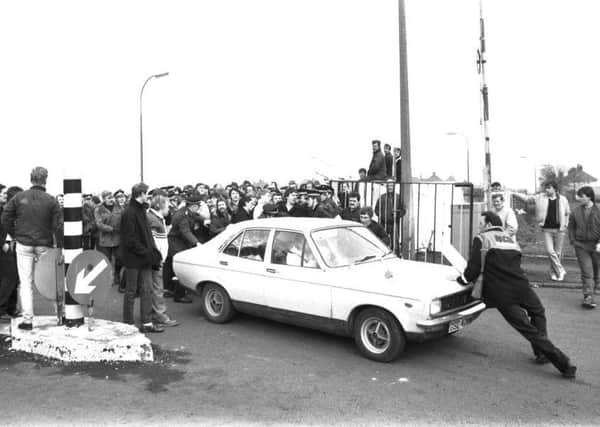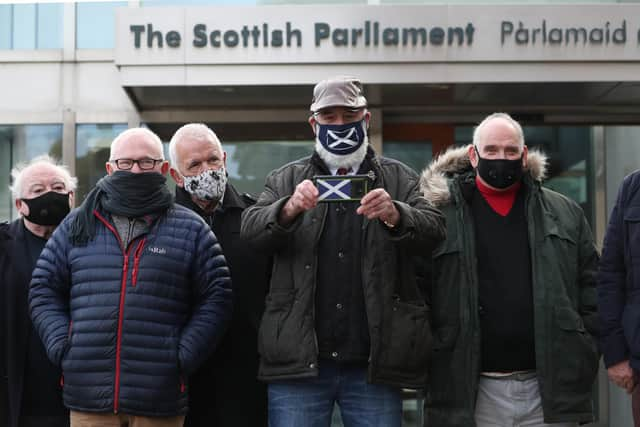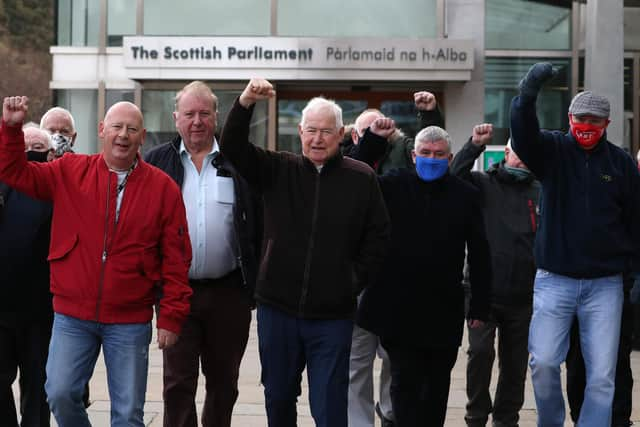Historic move as Scots miners are to be pardoned for strike convictions


Miners convicted of breach of the peace and similar crimes will have the offences forgiven under a Bill which will be presented to the Scottish Parliament, after the landmark decision which campaigners hope will pressure the Government south of the border to do the same.
Millions protested against pit closures during the industrial dispute with Margaret Thatcher's government in 1984/5.
Advertisement
Hide AdAdvertisement
Hide AdAround 1,400 miners were arrested and more than 500 were convicted in Scotland during the bitter, year-long national strike.


But it didn't end there - many lost their jobs and were blacklisted by employers. For decades they have had to bear the brunt of the stigma of a criminal record for what campaigners say was ‘trumped up charges’.
Today miners and campaigners outside the Parliament welcomed the announcement as government told MSPs that the offences dished out during the 1984-85 strike would be pardoned, paving the way for the charges to be quashed.
Unions said the landmark decision by the independent review, chaired by human rights lawyer John Scott QC, would “right historic wrongs”.
"It has been a long time coming"


Advertisement
Hide AdAdvertisement
Hide AdFor Alex Bennett, a former miner who was convicted of breach of the peace during the strikes, hearing the outcome of the inquiry today was a victory.
"I'm absolutely delighted with the result. For years I was so angry about what happened to us. It has been a long time coming. We have been at this for six years now. I hope it will put pressure on the Government to do the same down south."
Mr Bennett, 72, was charged with breach of the peace just before Christmas in December 1984 and fined £100. He got his P45 through the door the next month and was out of work for three years after being blacklisted.
Despite winning his case against the coal board for unfair dismissal he didn't get his job back and was turned away by other local employers. He said: "I remember when I got fired, the boss hadn't even talked to us about it. They took a hard line.
Advertisement
Hide AdAdvertisement
Hide Ad"The coal board didn't recognise the acquittal and wouldn't reinstate me. I wanted my job back. The tribunal awarded compensation of £13,000 and that was a help when we were hard up as a family. My two kids were still at school at the time."
"They tried to charge us with inciting a riot but they couldn't make it stick so charged us with breach of the peace. The police officers who gave evidence against me said I was causing bother, forcing my way through police lines. That was not true. They made me out to be a criminal. It was a trade dispute."
Mr Bennett, from Edinburgh, then had a black mark against his name and had to rely on benefits and help from the union to feed his family. He said: "It was hard to take, I'm a grafter and I resented it. I couldn't even get a job in the co op selling sausages. I've never in all my life even had a parking ticket!"
The former Chairman of the National Miners Union at Monktonhall Colliery started work as a miner in 1962 at age 15.
Advertisement
Hide AdAdvertisement
Hide AdOn the day he was arrested, the Coal Board had offered payments to strikers who agreed to return in a bid to divide the strikers. Mr Bennet says the snatch squads, known to the miners as 'Maggie's boot boys', were aggressive.
In the Lothians, a token picket of six was maintained most of the time at Monktonhall while the mass pickets took place at Bilston Glen, where Mr Bennett had gone to support the strikers.
He was bundled into the back of a police van and taken to Dalkeith where he was photographed and fingerprinted with a dozen other fellow workers.
He recalls: "The picket lines had all been peaceful but the police changed tactics in June of 1984. They took our local Police out of the lines, they had all known us. When they sent in Maggie's boot boys to make mass arrests, the Police got aggressive with us, there was quite a lot of pushing and shoving. We were grabbed and tossed into the vans and taken to jail. They went for the union officials and they knew our names."
Advertisement
Hide AdAdvertisement
Hide AdAltogether he says around 116 were sacked in a similar way in Lothian. Mr Bennett said a pardon is significant for many families in Scotland. It will be applied to those who have passed away.
"I have a good friend who passed away recently. A few years ago he wanted to take his wife to Vegas for their golden wedding anniversary, her dream holiday. But he couldn't get the visa because he had a criminal record. His daughter wants his name cleared. We all want our names cleared. It really would mean a lot."
Under the bill announced today by Justice Secretary Humza Yousaf a pardons scheme will require new legislation to be introduced by the Scottish Government and passed by the Scottish Parliament.
Scottish Labour MSP Neil Findlay who led the fight for a pardon said:“Many former miners and their families have waited years for this -they have paid a heavy price for these convictions, losing their jobs, redundancy payments and being blacklisted from employment.
Advertisement
Hide AdAdvertisement
Hide Ad“Today we have begun the process of righting these historic wrongs. I am delighted to have played my part in this and hope that progress with the necessary legislation can proceed through parliament before the forthcoming election."
Nicky Wilson, President of the National Union of Mineworkers (Scotland), said: “The NUM in Scotland welcomes the outcome of the independent inquiry set up by the Scottish Government, the fact that this injustice is now being addressed by a Pardon being given to Miners found guilty of offences in relation to the 84-85 Miners strike removes a stigma that has lasted for 36 years.
Justice Secretary Humza Yousaf said: "Although more than three decades have passed since the main miners' dispute, the scars from the experience still run deep. The report indicates that in some areas of the country, the sense of having been hurt and wronged remains corrosive and alienating."This was true for many who were caught up directly in the dispute - and also for their families and communities."